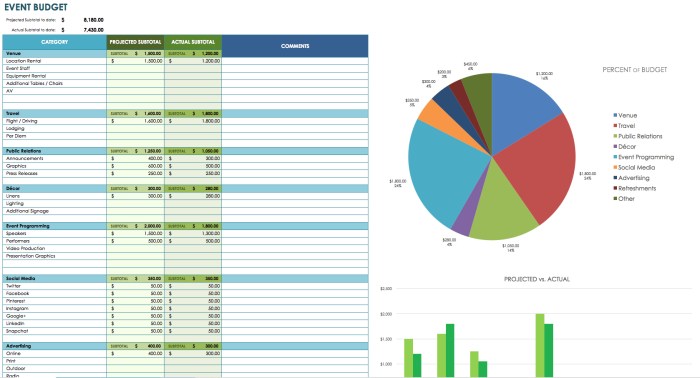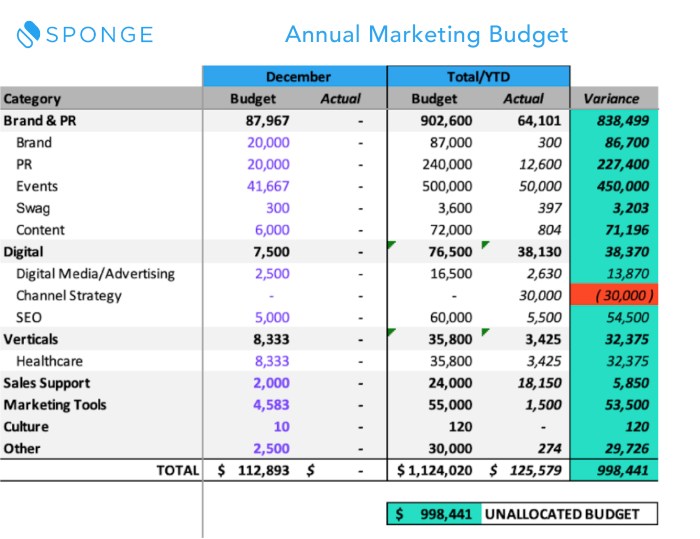Building a Marketing Budget sets the stage for business success with a clear roadmap for financial strategies. Dive into this guide for expert advice and insights.
From understanding the importance of budget components to smart allocation techniques, this article covers it all.
Overview of Building a Marketing Budget

Having a well-defined marketing budget is crucial for businesses of all sizes to effectively plan, execute, and measure their marketing efforts.
Key Components of a Marketing Budget
A marketing budget should include the following key components:
- Advertising costs
- Public relations expenses
- Digital marketing expenditures
- Promotional activities budget
- Staffing and agency fees
Benefits of Creating a Marketing Budget for Businesses, Building a Marketing Budget
Creating a marketing budget offers several benefits:
- Provides a clear roadmap for allocating resources
- Helps in setting realistic goals and targets
- Allows businesses to track and measure the effectiveness of their marketing campaigns
- Ensures better financial control and management
- Assists in identifying areas for improvement and optimization
Setting Marketing Budget Objectives
Setting clear objectives for a marketing budget is essential to ensure that resources are allocated effectively and that goals are achieved. By following the SMART criteria (Specific, Measurable, Achievable, Relevant, Time-bound), businesses can create meaningful and actionable objectives for their marketing budget.
Hey, do you have a killer idea for a business but don’t know where to start? Check out this awesome guide on Building a Startup Business and learn all the ins and outs of entrepreneurship. From creating a solid business plan to securing funding, this resource has got you covered. Get ready to turn your dreams into reality!
Examples of SMART Objectives
- Increase website traffic by 20% within the next quarter through targeted and content marketing strategies.
- Generate 100 new leads per month by the end of the fiscal year through a combination of social media advertising and email campaigns.
- Improve customer retention rate by 15% by implementing a loyalty program and personalized marketing initiatives by the end of the year.
Aligning Budget Objectives with Business Goals
Setting marketing budget objectives that align with overall business goals is crucial for ensuring that resources are utilized effectively and that the marketing efforts contribute to the growth and success of the company. By linking budget objectives with broader business objectives, companies can ensure that every dollar spent on marketing is working towards achieving the overarching goals of the organization.
Hey, are you ready to dive into the world of entrepreneurship and start building a startup business? Check out this awesome guide on Building a Startup Business to learn the ins and outs of turning your innovative ideas into a successful venture. It’s time to hustle and make your dreams a reality!
Analyzing Past Performance and Market Trends
When creating a marketing budget, analyzing past performance and market trends is crucial for making informed decisions and maximizing the effectiveness of your strategies. By looking at what has worked in the past and understanding current market trends, you can allocate your budget more efficiently and achieve better results.
Significance of Analyzing Past Marketing Performance
Analyzing past marketing performance allows you to identify what strategies have been successful in reaching your target audience and driving sales. By examining metrics such as conversion rates, ROI, and customer acquisition costs, you can determine which campaigns have been most effective and allocate resources accordingly.
- Look at sales data to see which products or services performed well in the past.
- Review previous marketing campaigns to identify successful tactics and messaging.
- Analyze customer feedback and reviews to understand what resonates with your audience.
Impact of Market Trends on Budget Decisions
Market trends can have a significant impact on your budget decisions, as they influence consumer behavior, competitive landscape, and industry dynamics. By staying informed about current trends, you can adjust your marketing strategies to align with market demands and stay ahead of the competition.
- Monitor industry reports and publications to stay updated on market trends.
- Use social media listening tools to track conversations and sentiment around your brand and industry.
- Attend industry conferences and events to network and gain insights into emerging trends.
Methods for Conducting Analysis of Past Performance and Market Trends
Conducting a thorough analysis of past performance and market trends involves gathering data, interpreting insights, and making data-driven decisions. Utilize a combination of internal data, market research, and competitive analysis to inform your budgeting process.
- Utilize analytics tools to track key metrics such as website traffic, conversion rates, and customer engagement.
- Conduct surveys and focus groups to gather feedback from customers and understand their preferences.
- Benchmark your performance against industry standards and competitors to identify areas for improvement.
Allocating Budget Across Marketing Channels: Building A Marketing Budget

When it comes to allocating budget across different marketing channels, it’s essential to carefully consider the strengths and weaknesses of each option to make the most effective use of your resources.
Comparing Marketing Channels
Before deciding how to allocate your budget, it’s crucial to compare different marketing channels, such as digital, traditional, social media, and more, to determine which ones align best with your overall marketing objectives.
- Consider the target audience for each channel and which platforms they are most active on.
- Evaluate the cost-effectiveness of each channel and how it fits into your overall marketing strategy.
- Look at the reach and engagement levels of each channel to determine where your efforts are likely to have the most impact.
Tips for Effective Budget Allocation
Once you’ve compared the different marketing channels, follow these tips to allocate your budget effectively:
- Set clear goals and objectives for each channel to ensure alignment with your overall marketing strategy.
- Allocate a larger portion of your budget to channels that have proven to drive the highest ROI in the past.
- Consider testing smaller budgets on new or emerging channels to see if they are worth investing more resources in.
Monitoring and Adjusting Budget Allocations
Monitoring the performance of each marketing channel is crucial to ensure you are getting the most out of your budget. Here are some important points to consider:
Regularly track key performance indicators (KPIs) for each channel to gauge effectiveness.
- Be prepared to adjust your budget allocations based on the performance data you gather.
- Stay agile and flexible in your approach, reallocating funds to channels that are performing well and cutting back on those that are not delivering results.
